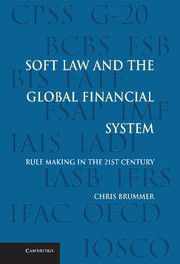Book contents
- Frontmatter
- Contents
- Acknowledgments
- Key Abbreviations
- Introduction The Perils of Global Finance
- 1 Territoriality and Financial Statecraft
- 2 The Architecture of International Financial Law
- 3 A Compliance-Based Theory of International Financial Law
- 4 How Legitimate Is International Financial Law?
- 5 Soft Law and the Global Financial Crisis
- 6 The Future of International Financial Law
- Index
- References
6 - The Future of International Financial Law
Published online by Cambridge University Press: 05 June 2012
- Frontmatter
- Contents
- Acknowledgments
- Key Abbreviations
- Introduction The Perils of Global Finance
- 1 Territoriality and Financial Statecraft
- 2 The Architecture of International Financial Law
- 3 A Compliance-Based Theory of International Financial Law
- 4 How Legitimate Is International Financial Law?
- 5 Soft Law and the Global Financial Crisis
- 6 The Future of International Financial Law
- Index
- References
Summary
The 2008 financial crisis serves as a reminder for both policymakers and the public of the fragility of the global financial system. It also unveiled with tragic clarity that the national and international regulations in place prior to the crisis to ensure global financial stability were far from adequate. In this book, we have examined the new institutional arrangements, standards, codes, and reports created to meet the challenges of global finance. We have also seen, however, the persistence of important gaps, sluggish and nationally oriented problem solving, and the high costs of regulatory error when international rules are flawed.
For some commentators, these limitations reveal defects in the very institutional foundations on which international financial law is built, and indicate that more radical changes and reforms are required beyond the revamped Financial Stability Board and G-20. Specifically, some experts have called for a more formal “World Financial Organization,” akin to the WTO, that would act as the primary international standard setter for finance, free from the distortional effects of power politics. Under such a centralized, treaty-based international organization, more official “hard law” models of global governance could be leveraged to more effectively supervise mobile market participants.
- Type
- Chapter
- Information
- Soft Law and the Global Financial SystemRule Making in the 21st Century, pp. 266 - 284Publisher: Cambridge University PressPrint publication year: 2011



